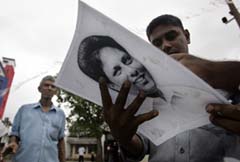Lasantha Wickramatunga was gunned down in his car last week on his way to work. According to colleagues, his attackers used an automatic pistol equipped with a silencer. After they smashed in one of his car windows, they repeatedly shot Lasantha at close range. Somehow he didn’t die on the spot. He died about three hours later in a hospital operating room. Just days after his death, his newspaper published his final editorial, showing that Lansantha may have seen what was coming.
Lasantha was a big, important, controversial name in Sri Lankan journalism. He had taken on the government–make that many of Sri Lanka’s governments–many times in the 25 years he was a journalist. He was argumentative and wrote from a distinct political position. In Sri Lanka, with its corrupt governments and its seemingly interminable Tamil secessionist war, taking a principled stance is dangerous.
But he was a committed journalist. After he was killed on January 8, his paper, The Sunday Leader, ran his last editorial–“And Then They Came For Me”–on January 11. It explains why he did what he was doing, and laid out clearly the drive that makes journalists take on the powerful. The editorial’s arguments are based in Sri Lanka’s brutal political reality, but they are universal to people who follow this career everywhere. Here’s Lasantha’s lead, but follow the link for the entire piece, it’s really worth it, particularly if you do this sort of work for a living:
No other profession calls on its practitioners to lay down their lives for their art save the armed forces and, in Sri Lanka, journalism. In the course of the past few years, the independent media have increasingly come under attack. Electronic and print-media institutions have been burnt, bombed, sealed and coerced. Countless journalists have been harassed, threatened and killed. It has been my honour to belong to all those categories and now especially the last.
A death like Lasantha’s generates a lot of emotion, and testimonials and anguished e-mail messages are flying back and forth. A colleague from Asiaweek magazine, Arjuna Ranawana, sent around a message pouring out his grief and anger. Arjuna was Asiaweek‘s South Asia correspondent for years. He knew Lasantha well; they had worked at the Leader together. Arjuna was the director of the Sri Lanka College of Journalism for a while, and now is news manager for Omni TV in Edmonton, Canada.
The government has promised a full investigation of Lasantha’s death, and of the early morning attack on Sirasa TV a few days earlier. CPJ called for a nonpartisan investigation into the MTV attack and diplomatic pressure to be put on the government to clarify what happened in Lasantha’s killing. I checked with Arjuna, and he is OK with me reproducing some of his e-mail message:
I for one do not expect such an investigation to yield results but believe them to be cynical public statements being made by a regime bent on killing the messenger. This is because there have been so many of these investigations launched and none have borne results. Either the IGP [Inspector General of Police] never gets those orders and only reads them in the newspapers, the police are utterly inept, or the government is lying to the public and allowing the killers to get away with a bundle of cash, a nod and a wink. Can you even remember the number of special investigations launched into these types of killings, which include MPs N Raviraj and P Maheswaran? These include assaults on journalists and the horrible farce that exists around Minister Mervyn de Silva’s incursion into Rupavahini. All have probes, no? Even Presidential Commissions. There is still space though, for the IGP to prove me wrong.
It would be good for the IGP, and for President Mahinda Rajapaksa to prove Arjuna, and all the other skeptics, Sri Lankans and non-Sri Lankans, wrong. But so far, that doesn’t look like it will happen.
